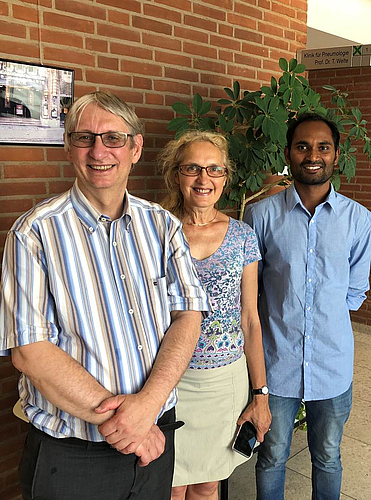Alpha-1 antitrypsin deficiency is a genetic metabolic disease caused by the deficiency of the protease inhibitor alpha-1-antitrypsin (AAT). The AAT deficiency affects both the lungs and the liver.
Genetic changes in the gene SERPINA1 were identified as the reason for the reduced production of the AAT protein as early as the 1960s. Depending on the respective genetic change, the severity of the disease varies. Despite this knowledge, it has been difficult to predict the course of the disease.
Prof. Dr. Sabina Janciauskiene, a researcher at BREATH, the Hanoverian site of the German Center for Lung Research, has been studying additional factors influencing the development of AAT-associated lung and liver disease for many years. Normally, the protein AAT is produced in the liver and then released into the blood. In the lung, however, neutrophils produce the protective protein during an inflammatory reaction. With her team, Prof. Janciauskiene was able to show that leukocytes, the white blood cells, also produce the protein AAT. In addition, they were able to observe that leukocytes also produce two truncated variants of the AAT protein. Based on these findings, the scientists were able to detect the formation of these truncated AAT proteins in neutrophils. Prof. Janciauskiene explains: "We suspect that not only the amount of AAT influences the course of the disease, but that these newly discovered, truncated protein variants also play a role."
Prof. Janciauskiene and PhD student Srinu Tumpara recently received the € 50,000 ALTA (Alpha-1 Antitrypsin Laurell's Training Award) Award for their efforts to further investigate the impact of these truncated AAT proteins on disease progression. The young scientist will work on the project. In a next step, Prof. Janciauskiene and her PhD student want to examine the frequency with which the truncated AAT proteins occur in the various genetic variants of AAT deficiency in the lungs and liver. For this purpose, patients with pulmonary emphysema or liver cirrhosis will be compared to clinically healthy patients. The scientists hope to gain new insights how to improve the treatment of patients with AAT deficiency and possibly how to adapt therapy individually.
Prof. Dr. Sabina Janciauskiene is head of the Molecular Pulmonary work group of the Department of Pulmonology at the Hannover Medical School.
Text: CD
Picture: AZ

Prof. Dr. Tobias Welte, Director of the Clinic of Pneumology at MHH and the winners of this year's ALTA Award Prof. Dr. Sabina Janciauskiene ánd her PhD student Srinu Tumpara.